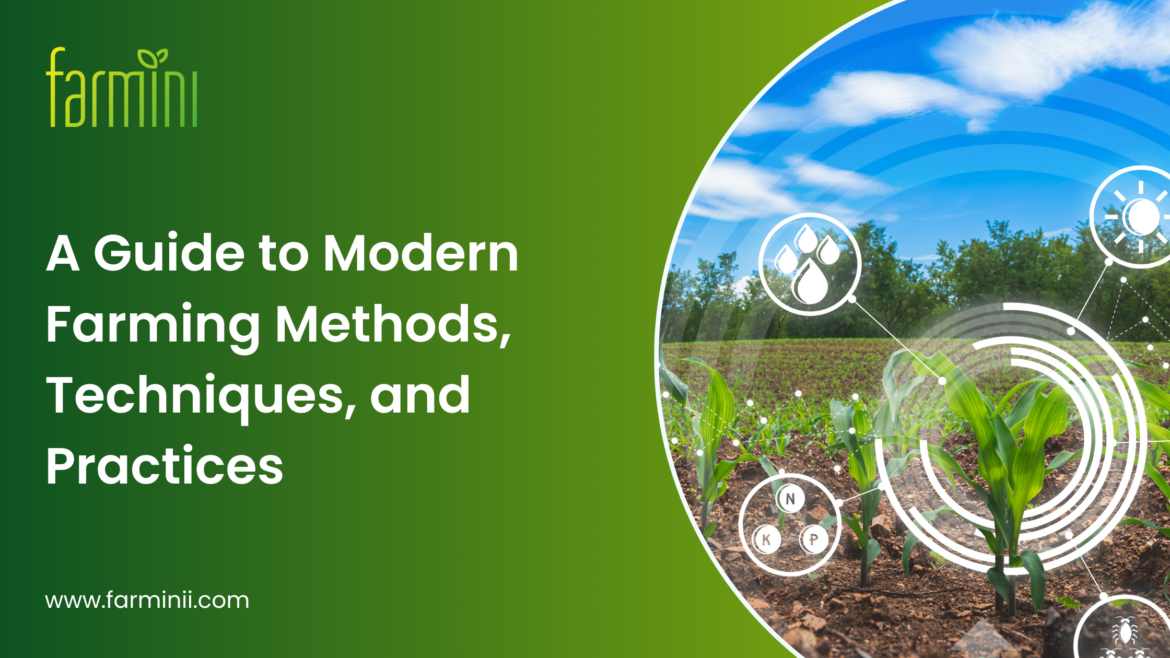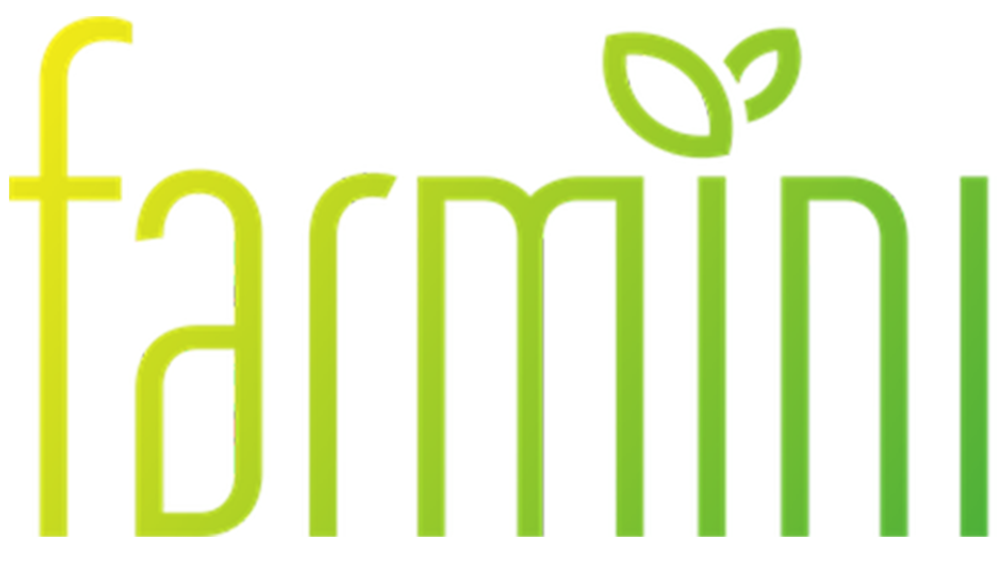
Agriculture is more than just a source of income; it’s a lifestyle. Recently, there has been a significant shift from traditional practices to modern farming methods, characterized by the integration of technology, sustainability, and increased efficiency.
These modern farming methods range from precision agriculture to innovative urban farming techniques, marking a transition towards embracing new technologies and rethinking our interaction with the environment. Deloitte has predicted a 50% growth over the 200 million installed base of IoT, which will account for almost 300 million in 2024.
In this blog, we will explore the various aspects of modern farming methods, including the techniques and practices adopted to meet the global food security challenges posed by a rapidly expanding population.
What is the Need for Modern Farming Methods in Agriculture?

The need for modern farming methods over traditional farming methods arises from several critical factors:
- Increased Food Production: With the global population continuously growing, there is a pressing need to increase food production. Modern farming methods, such as precision agriculture and genetically modified crops, can significantly boost yields, ensuring a more stable and abundant food supply.
- Resource Efficiency: Traditional farming often involves practices that can be resource-intensive and less efficient. Modern methods utilize resources like water, fertilizers, and energy more efficiently, reducing waste and minimizing costs.
- Environmental Sustainability: Modern farming methods are often designed to be more sustainable, focusing on reducing the environmental impact. Practices like crop rotation, conservation tillage, and integrated pest management help preserve soil health, reduce chemical runoff, and lower carbon emissions.
- Adaptation to Climate Change: Climate change poses new challenges to traditional farming, including unpredictable weather patterns and extreme conditions. Modern farming methods are better equipped to cope with these changes, using technology to monitor and adapt to environmental conditions.
- Technological Advancements: The integration of technology in modern farming, such as the use of drones, IoT devices, and AI, allows for more precise and informed decision-making. This leads to better crop management, disease control, and yield prediction.
- Labor Efficiency: Traditional farming can be labor-intensive. Modern methods often automate many processes, reducing the need for manual labor and making farming less physically demanding.
- Quality and Safety: Modern farming methods can lead to higher quality produce with better control over food safety standards. Techniques like hydroponics and controlled environment agriculture can produce cleaner and healthier crops.
- Economic Viability: While the initial investment in modern farming techniques can be high, they often lead to greater economic viability in the long run due to increased productivity, efficiency, and quality of produce.
- Global Market Demands: As international trade and standards evolve, modern farming methods can help farmers meet the quality, safety, and sustainability standards required in global markets.
- Urban Farming Development: Modern farming methods enable the growth of urban farming, bringing food production closer to urban consumers, reducing transportation costs and carbon footprint.
Modern Farming Methods and Techniques

Here are the modern farming methods and techniques that are used to ensure a sustainable balance:
Organic Farming
Organic farming is indeed gaining popularity in India. It avoids synthetic chemicals and GMOs, focusing on sustainable and environmentally friendly techniques. This method produces healthier food, preserves soil fertility, and often commands higher market prices, thereby increasing income for farmers.
Greenhouse Farming
Greenhouse farming, a key component of modern farming methods, allows for the cultivation of crops in controlled environments, enabling year-round production. This method is especially beneficial in regions with extreme weather conditions. Greenhouses, whether traditional glass structures or UV-resistant plastic, offer advantages like protection from pests and extreme weather.
Hydroponics
Hydroponic farming, one of the revolutionary modern farming methods, involves growing plants in nutrient-rich water solutions. It’s highly efficient in water and nutrient use, reduces pest and disease risks, and can yield higher outputs in smaller spaces. Hydroponics is increasingly popular in urban areas and locations with poor soil quality or limited water resources.
Aquaponics
Combining aquaculture with hydroponics, aquaponics uses fish waste to fertilize plants while the plants purify the water for the fish. This creates a sustainable, closed-loop, particularly efficient, and space-saving system, ideal for urban environments.
Aeroponics
Aeroponic farming, part of modern farming methods in India, is gaining popularity due to its efficiency and environmental benefits. It involves growing plants without soil, using a mist environment to deliver nutrients directly to the roots. This method conserves water and space, making it ideal for areas with poor soil or water scarcity, and supports year-round farming.
Vertical Farming
In vertical farming, crops are grown in stacked layers, often in controlled environments like greenhouses or indoor facilities using artificial lighting. This method is suited for urban areas with limited space, and it allows for high-yield, year-round production.
Micro Farming
Micro farming, which maximizes productivity on small land areas using technology like automated irrigation and LED lighting, is often found in urban settings. It’s a technique that demonstrates high output on minimal land.
Regenerative Farming
This sustainable farming method focuses on increasing biodiversity and soil health. It aims to reduce emissions and costs while enhancing the soil’s natural fertility, which is crucial for sustainable agricultural practices.
Monoculture
Monoculture, though less common in modern farming methods, involves the cultivation of a single crop in a specific area. It holds significance for certain types of farming, such as indoor cultivation of medicinal plants.
Best Practices in Modern Farming Methods

Modern farming methods are continually evolving, incorporating advanced technologies and sustainable practices to tackle the challenges of rising demand, environmental sustainability, and efficient resource management. Here are some of the foremost best practices that are driving the future of modern farming methods:
- Precision Agriculture Technology: This approach uses data-driven techniques to optimize farming operations. By leveraging technologies like IoT, GPS, and AI, precision agriculture allows farmers to more accurately monitor and control variables such as moisture levels, soil conditions, and crop health. This leads to maximizing yields, improved efficiency, and reduced waste.
- Sustainable Farming Practices: Emphasizing environmental stewardship, sustainable farming practices include reducing the use of artificial fertilizers, increasing soil biodiversity, and integrating eco-friendly energy sources. Such practices aim to preserve biodiversity, minimize water and air pollution, and promote soil health, ensuring the long-term viability of farming operations.
- Adopting Advanced Technologies: Staying abreast of technological advancements is crucial in modern farming. Technologies like agricultural drones, robotic systems, and AI-driven tools are becoming integral in automating and optimizing various farming tasks. These technologies help in crop monitoring, pest control, irrigation optimization, and efficient harvesting, enhancing farm productivity.
- Digital Twins and AI in Decision Making: Digital twin technology offers farmers a virtual model of their physical farming operations, allowing for real-time and predictive analysis. This, combined with AI, aids in better decision-making regarding crop management, weather pattern analysis, and equipment maintenance.
- Blockchain in Supply Chain Management: Blockchain technology is being used to enhance traceability and transparency in agricultural supply chains. This technology ensures that all stages of the crop journey are monitored and verified, improving quality control and compliance with standards.
- Cloud Computing for Data Management: Cloud technology is revolutionizing data management in agriculture. It provides farmers remote access to important data, facilitating information integration from various sources. This enhances overall farm management and decision-making processes.
- Automation and Robotics for Labor Efficiency: To address labor shortages and improve operational efficiency, automation and robotics in farming include using self-steering vehicles, harvesting robots, and automated livestock management systems. These innovations are key in reducing human labor and increasing the precision of farming operations.
- Machine Learning in Crop Management: ML models are increasingly used for comprehensive crop management, offering insights into the most profitable crops, optimal farming strategies, and predictive analytics for market trends. This technology helps make informed decisions at every stage of the crop cycle.
- Optimized Irrigation and Pest Control with AI: Modern farming now utilizes AI to optimize irrigation by predicting localized weather patterns, thus ensuring efficient water use and reducing waste. AI also aids in planning pest control by anticipating humidity and wind patterns, allowing proactive measures against crop diseases and pests.
These best practices demonstrate the dynamic nature of modern farming, where technology, sustainability, and innovation converge to create a more productive, efficient, and environmentally friendly agricultural sector.
Join Farmini and Transform your Farming Practices Today!

Ready to take your organic farming journey to the next level? Farmini is here to guide you every step of the way. With our extensive range of comprehensive video courses, you’ll gain practical knowledge and expert insights into organic farming methods in India. Whether you’re just starting or looking to enhance your farming techniques, our interactive and accessible platform is designed to fit your learning needs.
Dive into our engaging video content, available anytime and anywhere, to explore the depths of organic farming. Benefit from our expert guidance and interactive Q&A sessions to address your specific queries. Don’t miss this opportunity to join a community of passionate farmers and agricultural enthusiasts, all striving for excellence in farming.
Join Farmini and transform your farming practices today! 🌱🚜
Click here to start your journey!
